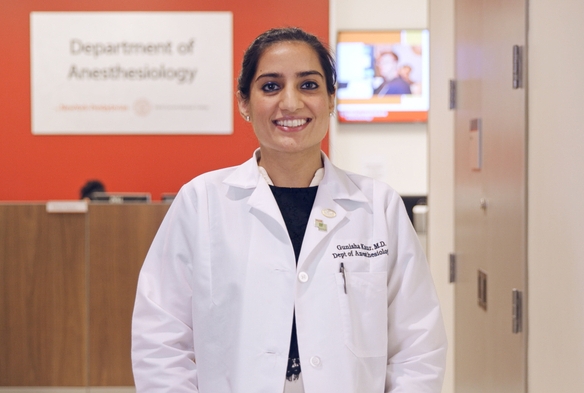Anesthesiologist and global health expert Dr. Gunisha Kaur and her research team recently won a prestigious National Academy of Medicine (NAM) Catalyst Prize.
The Catalyst Awards are a branch of the Healthy Longevity Global Competition that seeks to expand the human healthspan—usually defined as how many healthy years a person lives—by rewarding cutting-edge ideas to improve the physical, mental, or social wellbeing and health of people as they age. Up to 20 awards are being given this year to United States-based innovators, out of 1,100 applications received from organizations focused on “science, medicine, and health, to technology, finance, social sciences, and beyond,” NAM said.
NAM works with eight global collaborators that represent more than 50 countries and territories, all of which issued their own Catalyst Awards on the same day.
Dr. Kaur’s team won the prize for its project, “Digital Solutions to Reduce Maternal Morbidity and Mortality in Refugee Women,” which aims to clinically train and validate a digital refugee health system. The prize comes with $50,000 of seed funding and networking opportunities and makes them eligible for the next phases of the competition. Two other phases of application and awards follow, with a $5 million grand prize.
Project lead author Dr. Kaur is an associate professor of anesthesiology at Weill Cornell Medicine, director of the Weill Cornell Medicine Human Rights Impact Lab, and a medical director of the Weill Cornell Center for Human Rights, which provides forensic medical evaluations to people who seek asylum in the United States. For this project, she collaborated with Stephen Yale-Loehr, a professor of immigration law practice at Cornell Law School, and Dr. Richard Boyer, an assistant professor of anesthesiology at Weill Cornell Medicine and a core director at the Human Rights Impact Lab. The lab interfaces with the Center for Human Rights, conducting research to advance the health of refugees and displaced populations.
The project involves a wearable device plus a customized app for early risk stratification and identification of gestational hypertension and preeclampsia, which are pregnancy complications.
All pregnant refugee women are at elevated risk for developing these complications because of barriers that can prevent refugees from accessing in-person health care. Dr. Kaur shared that interviews with refugee patients revealed many didn’t access health care services because they believed erroneously that doing so would violate the law. Having an expert in immigration law, such as Yale-Loehr on the team, allows them to tell refugee women that since they are pregnant, they are allowed to access care such as prenatal visits and vaccines.
“Many refugees and asylum seekers worry that if they seek medical help while pregnant, they might be deported," Yale-Loehr said. "This new research builds on prior work Dr. Kaur and I did dispelling that concern. Our website Rights4Health informs immigrants about their eligibility for public benefits.”
As faculty fellows at the Mario Einaudi Center for International Studies, Dr. Kaur and Yale-Loehr also lead a team researching refugee and immigrant health as part of Global Cornell’s Migrations: A Global Grand Challenge initiative.
“Even with very few other resources, almost all or 90 percent have a cell phone, which gives us an enormous opportunity to disseminate health care information about pregnancy and prenatal visits, and vaccines,” she said.
The project also utilizes related biomarkers using predictive machine learning, ecological momentary assessments, and remote digital data for risk stratification and possible diagnosis, she said.
“Our idea is to bring health care to refugee women through the use of cutting-edge digital technologies,” said Dr. Kaur. “If we can improve health care access, we can start to look at improving disease diagnosis and treatment.”
Digital tools can help detect hypertension with high precision and can risk stratify for preeclampsia, so pregnant women with these conditions can be treated earlier in their pregnancies, she said. They have been used in landmark research studies such as the electronic Framingham Heart Study, but she wants to know exactly how they can be optimized for this patient population.
“That’s what this study is about: Can we train our digital tools to do it as well as a clinic visit?” she said. “While these patients do not typically attend clinic visits, over 90 percent of them do have access to digital tools.”
This project expands on work the team has done with digital technology in the last few years, but on an accelerated timeline: results need to be generated within 18 months.
Dr. Kaur remains consistently motivated about her work, she said. First, she believes it is the humane thing to do to provide refugees who have survived forced displacement appropriate and adequate medical care. Because her family came to America this way, she has a personal relationship with the medicine and science of this population and has developed a passion and drive to make a difference that manifests in this project.
“The refugees and asylum seekers that we work with in our clinic and lab are people just like you, and just like me,” Dr. Kaur said. “Recognizing that shared humanity—particularly that there is very little that distinguishes between ‘us’ and ‘them’—helps us to understand why this work is so important.”

